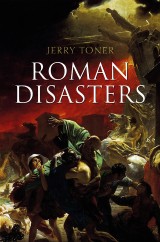Details

Roman Disasters
1. Aufl.
|
50,99 € |
|
| Verlag: | Wiley |
| Format: | EPUB |
| Veröffentl.: | 10.07.2013 |
| ISBN/EAN: | 9780745665498 |
| Sprache: | englisch |
| Anzahl Seiten: | 216 |
DRM-geschütztes eBook, Sie benötigen z.B. Adobe Digital Editions und eine Adobe ID zum Lesen.
Beschreibungen
<i>Roman Disasters</i> looks at how the Romans coped with, thought about, and used disasters for their own ends. Rome has been famous throughout history for its great triumphs. Yet Rome also suffered colossal disasters. From the battle of Cannae, where fifty thousand men fell in a single day, to the destruction of Pompeii, to the first appearance of the bubonic plague, the Romans experienced large scale calamities.Earthquakes, fires, floods and famines also regularly afflicted them.<br /><br />This insightful book is the first to treat such disasters as a conceptual unity. It shows that vulnerability to disasters was affected by politics, social status, ideology and economics. Above all, it illustrates how the resilience of their political and cultural system allowed the Romans to survive the impact of these life-threatening events. The book also explores the important role disaster narratives played in Christian thought and rhetoric.<br /><br />Engaging and accessible, <i>Roman Disasters</i> will be enjoyed by students and general readers alike.
<p>1. What is a Disaster?</p> <p>2. Rome's Disasters</p> <p>3. The Disaster Experience</p> <p>4. Dealing with the Aftermath</p> <p>5. Thinking about Disaster</p> <p>6. A Culture of Risk</p> <p>7. Narratives of Disaster</p> <p>8. Inflicting Catastrophe</p> <p>9. The Psychological Impact</p> <p>10. Roman Disasters in Context</p>
"The publication of this timely, innovative and compelling book represents another example of refocusing in the historical profession. Before nation states became a category of analysis for historians, they viewed natural disasters as primary markers of chronological change. The professionalization of the discipline and the creation of numerous sub-fields pushed the centrality of natural disasters to the periphery. Jerry Toner’s excellent book continues efforts to bring disaster research into the mainstream of historical studies."<br /><i><b>Journal of Social History</b></i><br /><br />"A compelling and unexpected look at the ancient world, one peppered with refugee camps, tent cities, and displaced populations all looking for - and not necessarily finding - imperial benificence."<br /><i><b>AnOther</b> <b>Magazine</b></i><br /><br />"Accessible in style, wide-ranging in scope, and innovative in its combination of ancient sources and relevant modern scholarship, Toner’s book constitutes an excellent and long-overdue survey of Roman disasters generally, as well as offering insightful analyses of an array of topics, from Roman attitudes towards maritime risk to early Christian notions of divine causation."<br /><b>Greg Aldrete, University of Wisconsin-Green Bay</b><br /><br />"Professor Toner offers a fascinating portrait of how disaster was treated in the Roman world, at once so different from our own and offering compelling parallels. For me, a good grasp of the modern disasters field adds to the interest. In entertaining a wider range of issues than is usual, the study offers cause for reflection and a broadening of contemporary approaches."<br /><b>Kenneth Hewitt, Wilfrid Laurier University</b>
Jerry Toner is the director of studies in classics at Hughes Hall, University of Cambridge.

















